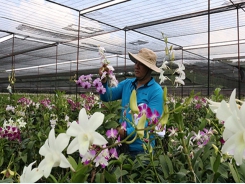Indoor mushroom cultivation brings high income

BÀ RỊA – VŨNG TÀU — The indoor cultivation of mushrooms has provided high incomes for farmers in the southern province of Bà Rịa-Vũng Tàu.
Woodear mushrooms are cultivated in Bà Rịa – Vũng Tàu Province’s Châu Đức District. – VNA/VNS Photo Hoàng Nhị
Farmer Nguyễn Thị Hoài, who is growing woodear and oyster mushrooms in 20 open-air shelters, grows two crops per year in Phú Mỹ Town’s Tóc Tiên Commune. She earns a profit of about VNĐ400-500 million (US$17,200-21,500) per crop.
Previously Hoài’s main income was from growing rice and fruit, but she decided to grow mushrooms after seeing a friend's mushroom farm in Đồng Nai Province in 2006.
Many farmers in Phú Mỹ Town and Châu Đức, Xuyên Mộc and Tân Thành districts earn stable incomes by growing mushrooms with advanced farming techniques.
Vũ Thị Hoàng Yến, who is growing woodear and oyster mushrooms and linh chi (Ganoderma lucidum) mushrooms in Châu Đức District’s Xà Bang Commune, has 56 shelters, including automatic spraying irrigation systems and equipment that makes the plastic bags in which the mushrooms are grown.
“Growing mushrooms requires careful tending,” she said.
Mushroom shelters, which have a roof, have to be airy and clean, have a humidity of 60-80 per cent, and covered with nets to prevent pests from damaging the mushrooms.
Yến harvests about 22 tonnes of woodear mushrooms, 60 tonnes of oyster mushrooms and 3 tonnes of linh chi mushroom a year, earning a profit of VNĐ1 billion ($43,000). She also provides jobs for 20 local workers.
To expand mushroom farming models, the Châu Đức District's Bureau of Agriculture and Rural Development has provided training courses for mushroom cultivation for farmers.
The indoor cultivation offers higher profits than other plants and requires less farming area, according to the province’s Farmers Association.
There are more than 60 households and companies growing mushrooms indoors in the province.
According to Nguyễn Chí Đức, head of the province’s Plant Cultivation and Protection Sub-department, several localities have specialised areas for growing mushrooms, especially linh chi mushroom, but their scale is small and the quality is uneven.
Value chains and linkages among localities and market information for mushroom growers are inadequate.
He said localities should set up co-operatives and co-operative groups that focus on commercial production and improve produce quality and competitiveness.
Co-operation
Twenty-two households in Xà Bang Commune have set up a cooperative group to exchange mushroom growing techniques and experiences.
The members grow mushrooms on a total area of 41ha and produce 165 tonnes of various kinds of mushroom a year.
Vũ Văn Khánh, a member of the group, has 25 shelters equipped with advanced farming techniques on a 2ha area.
Besides low-value mushrooms like woodear and rice straw mushrooms, he has been growing other high value mushrooms like linh chi and oyster mushrooms for three years. His mushrooms are sold to traders in HCM City and Đồng Nai Province.
Thân Xuân Động, deputy chairman of the Châu Đức District People’s Committee, said that farmers could grow mushrooms year round with advanced farming techniques. Some localities like Tân Thành and Châu Đức districts have established co-operatives and co-operative groups to promote mushrooms.
The Tân Giao Oyster Mushroom Co-operative in Châu Đức District’s Láng Lớn Commune was established last year and has seven members. Each member grows mushrooms on an area of 100-200sq.m.
Nguyễn Thanh Sơn, a member of Tân Giao, switched from breeding pigs to growing oyster mushrooms in 10,000 bags last year. The bags cost a total of VNĐ30-35 million ($1,300-1,500) and can be used up to four months.
During the four months, about 800 kilogrammes of oyster mushrooms are produced during four harvest periods, which yield total profit of VNĐ40 million ($1,720), he said.
Phạm Văn Hội, director of Tân Giao, said: “It is not difficult to grow oyster mushrooms since farming techniques are simple and do not require hard work.” However, farmers have to be aware of temperature, humidity and light to control the growth well, he added.
The co-operative, which sells its oyster mushrooms to traders in wholesale markets, plans to build a brand name for Tân Giao oyster mushrooms. It also plans to expand its mushroom growing areas so that it can produce enough mushrooms to meet large orders.
Related news
Tools

Phối trộn thức ăn chăn nuôi

Pha dung dịch thủy canh

Định mức cho tôm ăn

Phối trộn phân bón NPK

Xác định tỷ lệ tôm sống

Chuyển đổi đơn vị phân bón

Xác định công suất sục khí

Chuyển đổi đơn vị tôm

Tính diện tích nhà kính

Tính thể tích ao



 Ninh Thuận Province brings companies, farm co-operatives together
Ninh Thuận Province brings companies, farm co-operatives together  Đak Lak focuses on high-value speciality coffees
Đak Lak focuses on high-value speciality coffees